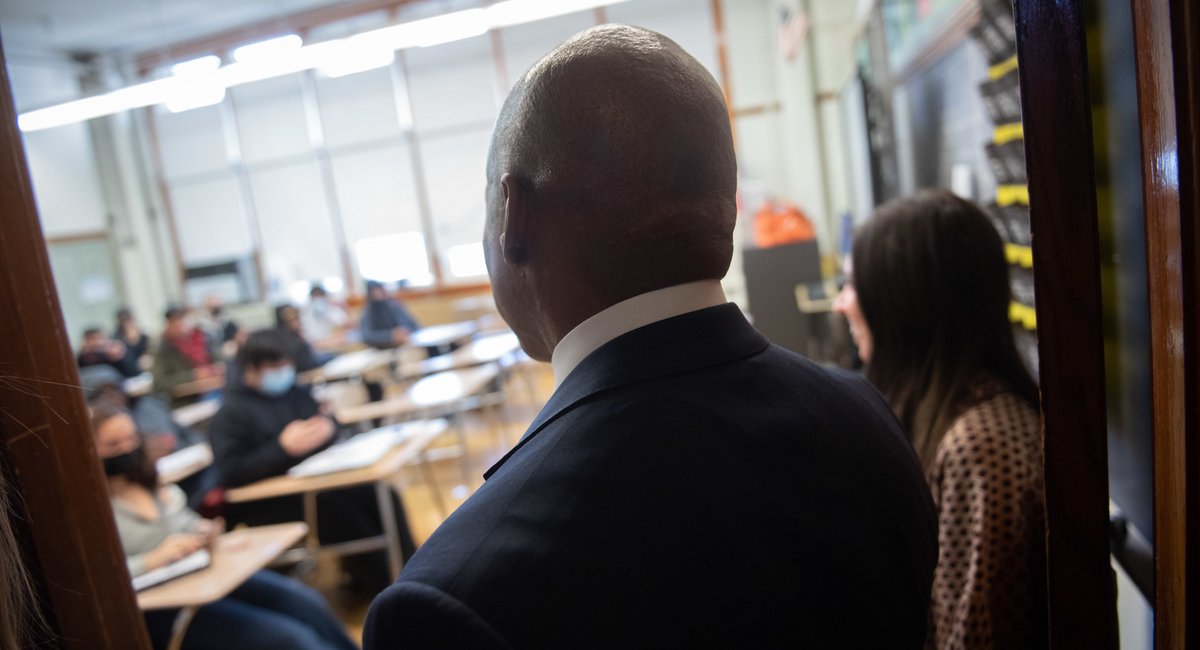The city’s teachers union, the United Federation of Teachers, cheered the bill in a written statement: “The passage and enactment of this legislation — which prioritizes the city’s poorest schools, phases in over five years, and provides exemptions when necessary for overcrowded buildings — would be a landmark achievement for this city’s children by the political leadership of our city and state.”
Despite being a top priority for many families and educators, recent efforts to reduce class size have stalled. Last winter, some New York City Council members and the United Federation of Teachers pushed for a bill on the city level that would require more square-footage per student as a way to reduce class sizes. They argued that, during the pandemic, smaller classes have become both an educational and health imperative. The proposed change in square footage would have reduced classes to an average of 14 to 21 students. But the education department said the proposal was cost prohibitive, and the city’s Independent Budget Office said as many as half of the city’s public schools would not be able to meet the mandate. Ultimately, the bill never came up for a full vote.
At many schools, classes are already smaller because of declining enrollment. But Adams’ budget calls for “rightsizing” funding for schools that have seen their enrollments dwindle, which may make it hard to pay for enough teachers to keep class sizes down.
Liu said shrinking classes is necessary to fulfill a longstanding court mandate and said the state had significantly increased funding for New York City schools last year to do just that.
“Small class sizes were part of the court decision in the Campaign for Fiscal Equity,” Liu said. “We fulfilled the funding promise, and with this new bill we’re also fulfilling the actual educational promise.”
“The time is now,” Benedetto told Gothamist.
Mayoral Control, parental involvement
Hochul had proposed a four-year extension to mayoral control as part of the state budget, but lawmakers decided to negotiate a shorter deal outside the financial plan.
“Two years was the consensus decision,” Liu said.
The bill would also substantially change the composition of the Panel for Educational Policy, or PEP, adding more representatives selected by parents.
The PEP is largely advisory but has the power to approve or reject contracts. It was established after Mayor Michael Bloomberg disbanded the Board of Education in 2002 and took control of the school system. With nine out of 13 members appointed by the mayor, it has largely served as a rubber stamp on City Hall’s education policies.
But the PEP has shown some independence from the mayor’s office in recent years, flexing its muscle to vote down a contract for a gifted and talented test for four-year-olds last year and, initially, voting against a longstanding school-funding formula that many parents say is problematic. Schools Chancellor David Banks promised to reform the formula, and the PEP ultimately approved it this month.
Right now, there are 15 members of the PEP: Nine appointed by the mayor, five appointed by the borough presidents and one elected by community education council presidents, which are comprised mostly of parents
Under the new bill, which is expected to pass on Thursday, the panel would include 23 people. The mayor would still make a majority of appointments, with a total of 13, and the borough presidents would continue to appoint 5, but parent representatives would increase from 1 to 5.
Some parents have been lobbying for more power over their children’s schools and more representation on the PEP. Legislators said the bill reflects many of the priorities they outlined.
“It was always the intent to strengthen parental voice and input, and we’ve accomplished that with these measures,” Liu said.
The bill would also require that the mayoral appointees to the PEP include one of each of the following: the parent of a child with an Individualized Education Plan (IEP), the parent of a student who is in a bilingual or English as a second language program, and the parent of a student in District 75 — the branch of the school system serving children with more complex disabilities. Members will also be provided six hours of training on financial contracts.
The legislation also calls for a new council specific to District 75, to be composed of 11 voting members and one non-voting member. The new body will be required to meet once a month and issue an annual report.
David Bloomfield, education professor at Brooklyn College and the CUNY Graduate Center said the changes to the PEP “marginally increase parent influence” while keeping the mayor “in charge through a majority of the appointments.”
“I don’t think it’s a big change,” he said of the change to the PEP. “There’s substance to the tweaks but they’re still tweaks.”
Hazel Crampton-Hays, a spokesperson for the governor, said, “Governor Hochul has made it clear that extending mayoral control is a priority before the end of session, and we look forward to reviewing the bill when passed by both houses.” A spokesperson for Adams said his office was likewise reviewing the bills.
This story has been updated with additional comment.
